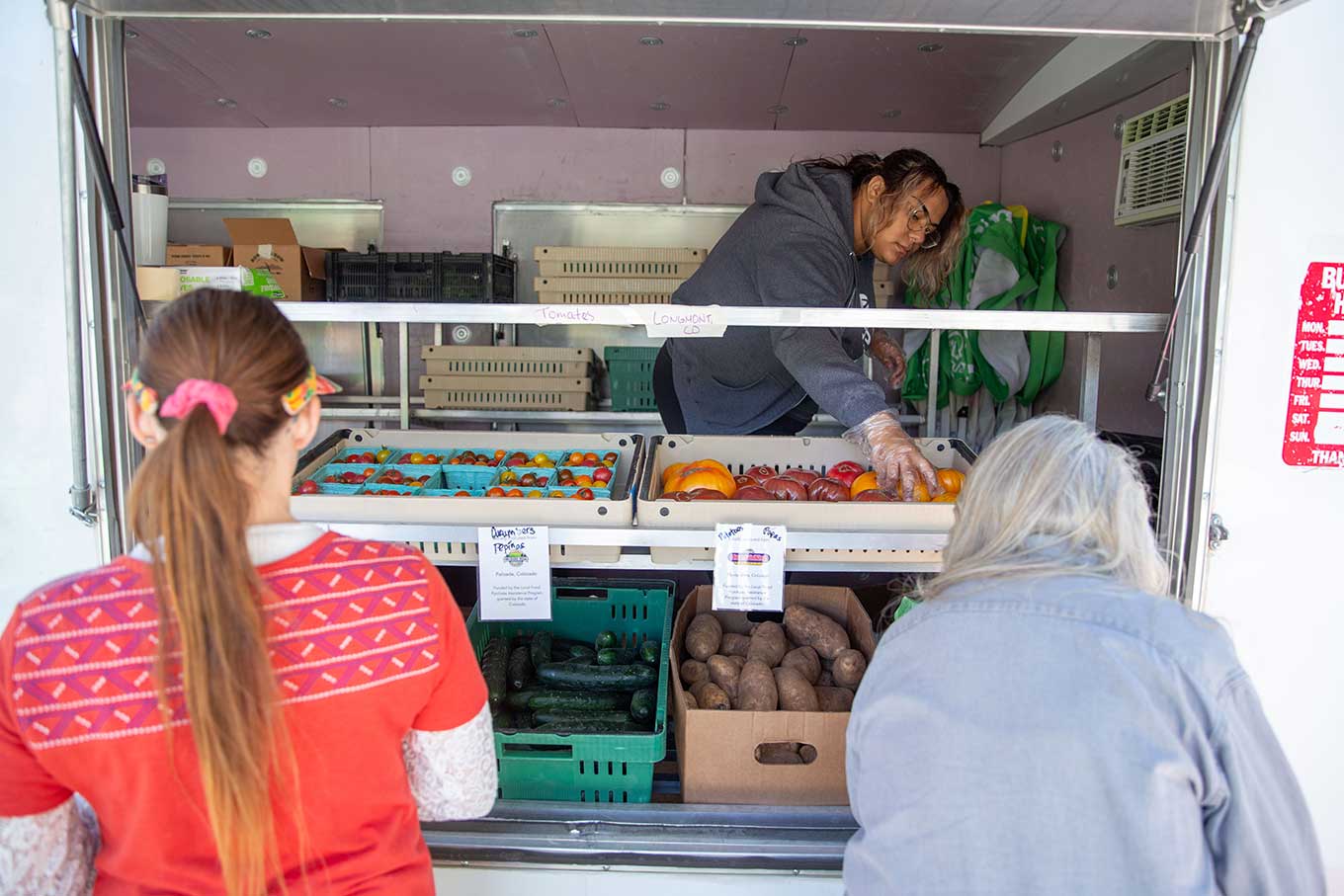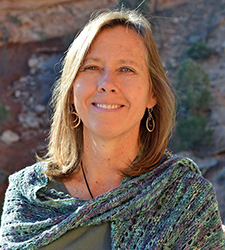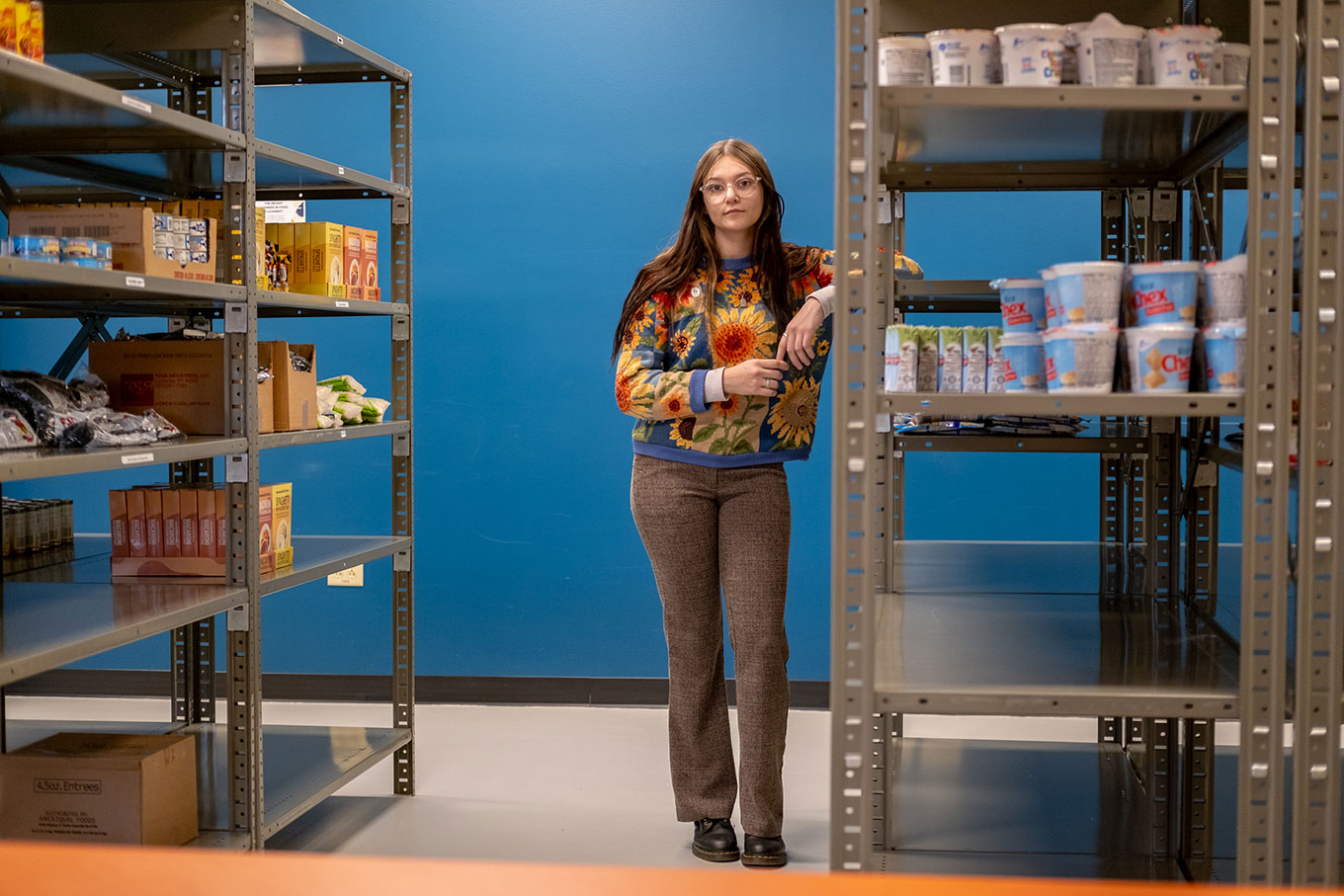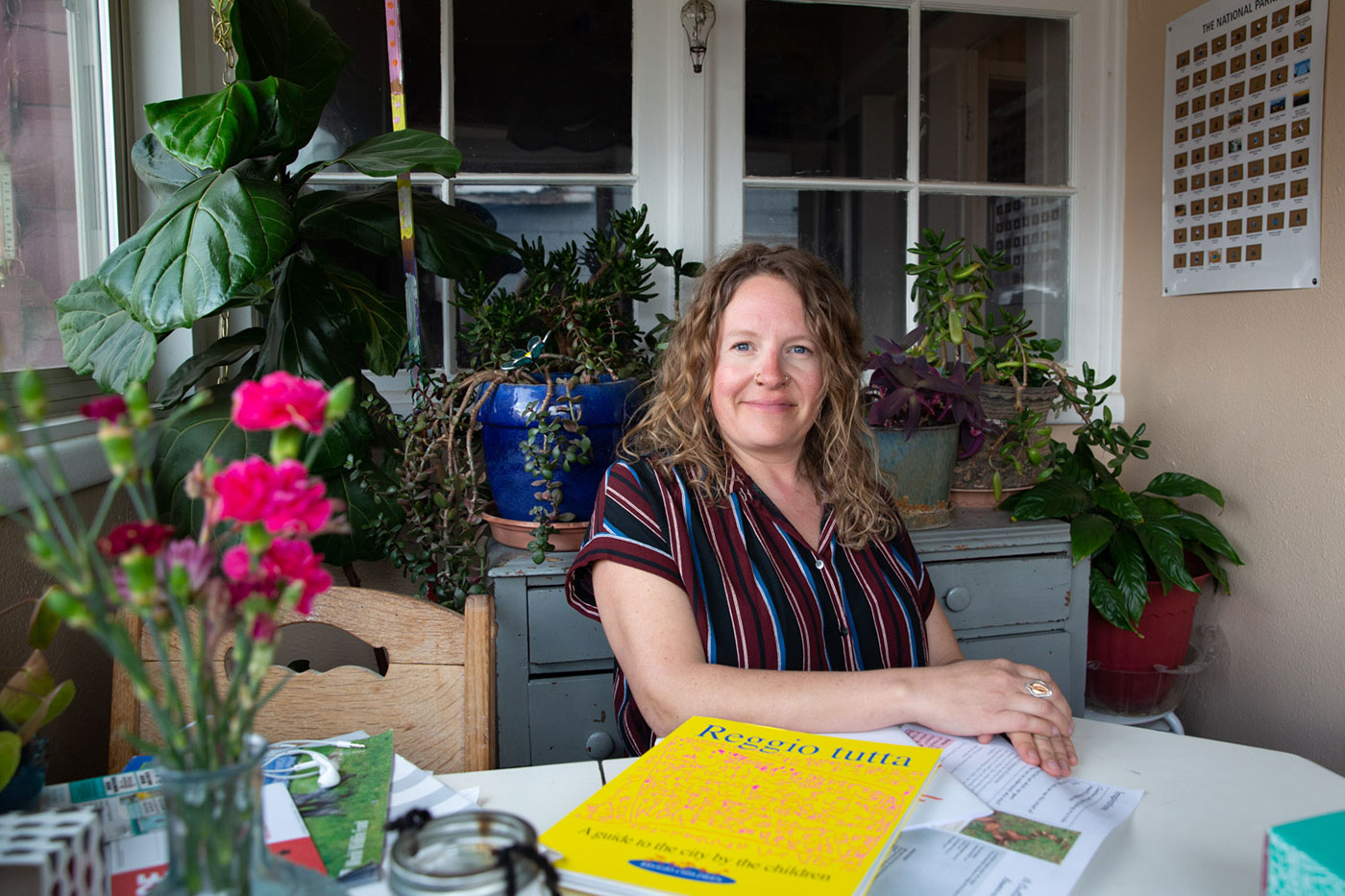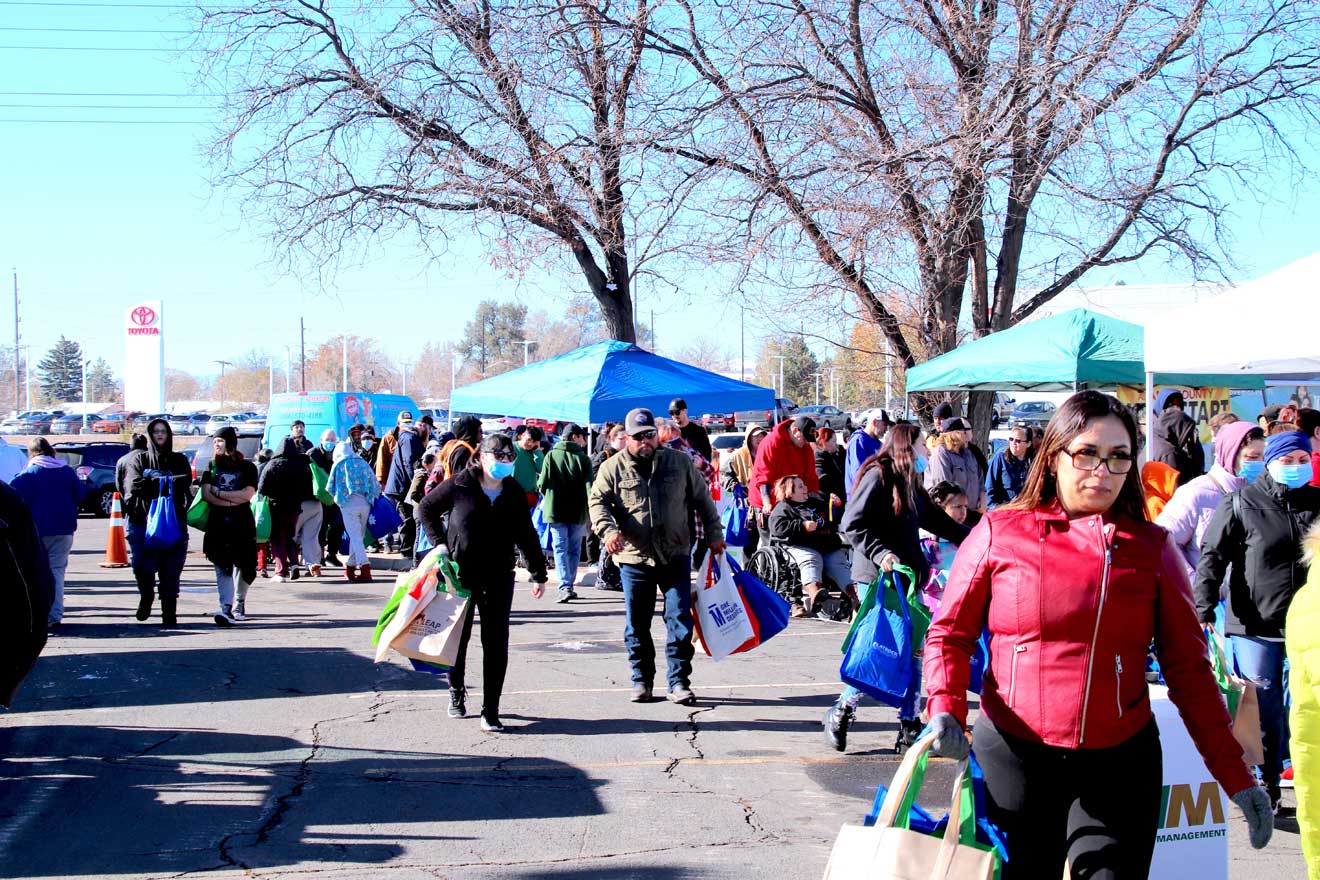In the parking lot of Garden Village Apartments in Grand Junction, Colo., a 20-foot trailer with side-panel windows displayed racks of fresh chard, lettuce, cucumbers, celery, dried pinto beans and potatoes on an April morning. It was early in the growing season, and that day’s bounty, much of it greenhouse-grown, was from Early Morning Orchard in nearby Palisade, a producer and distributor for small, regional farms throughout Colorado.
Longtime resident Ida Valdez used a walker to approach the “Harvest Mobile Market” after seeing a flyer inside her apartment complex advertising the event. The Harvest Mobile Market is a Community Food Bank of Grand Junction pilot program designed to bring fresh, locally grown produce to low-income neighborhoods where transportation barriers often exist.
Valdez, 76, used to walk the few miles to the nearest grocery store, but now she calls a cab or catches a ride with a relative—which isn’t always convenient, she said. Valdez has never had a driver’s license.
Valdez and her husband moved from Tennessee to Grand Junction 15 years ago. “My husband did all the driving,” she said. “Then he got sick with cancer. He passed away 11 years ago, so I got stuck here.
“Before my legs got bad, I walked everywhere. My blood is not circulating the way it should. It’s hard to walk; sometimes, my legs go numb.”
Chelsea Craine, the food bank’s program operations director, invited Valdez to fill a bag with whatever she wanted. “Have a blessed day,” said Valdez as she turned back toward her apartment, a bag of vegetables resting on the seat of her walker.
The Community Food Bank of Grand Junction, serving Mesa County, operates a food pantry three days a week. Since launching the Harvest Mobile Market pilot in 2023, staff have been collecting data and gauging interest for a permanent and sustainable mobile market selling Colorado-grown produce at affordable prices.
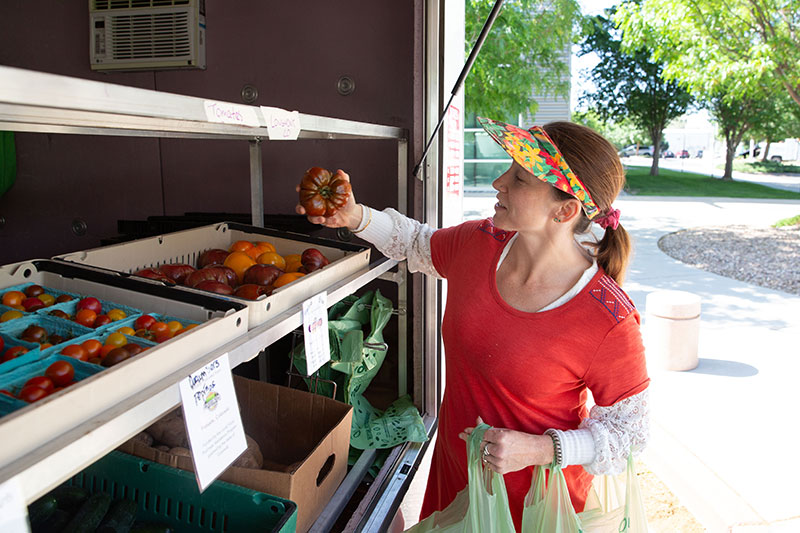
Brittany Pauls shops at the Community Food Bank of Grand Junction’s Harvest Mobile Market on Wednesday, May 23, 2024, at the Mesa County Human Services campus in Grand Junction. The food bank held 15 mobile food pantries at community sites in 2023. Photo by Luna Anna Archey / Special to The Colorado Trust
Leeanne and Jerimiah Hargis and three of their seven children came to the Garden Village mobile market to collect some free produce and eggs. The family doesn’t own a car, so once a month, Leanne walks 3.5 miles roundtrip to Walmart or a little further to City Market, pulling a wagon to haul groceries. In between trips to the store, the family visits the Community Food Bank pantry when they can carpool with Jerimiah’s mother, who owns a car.
Leanne said she’d be willing to pay for the food if a regular mobile market was established, especially if it accepted Supplemental Nutrition Assistance Program (SNAP) benefits. “It would save on gas. It would be saving my legs,” she said.
Community Food Bank Executive Director Alisha Wenger said the Harvest Mobile Market directly resulted from community feedback regarding transportation barriers and a desire for more fresh food. While the food is free for clients during the pilot phase, Wenger’s goal is to make the program sustainable via a paid market in 2025 that would accept SNAP/DUFB (Double Up Food Bucks) redemption options, as well as provide a flexible pricing model for low-income and low-access neighborhoods.
The food bank’s community advisory board—10 current or former food pantry clients—helped design the pilot effort and affirmed that the produce should not be free in a permanent mobile market program.
“There’s more dignity and accountability in this model. It’s not just a charitable act,” Wenger said. “They are also supporting local farmers.”
Community Food Bank is purchasing produce from Early Morning Orchard and Green Junction Farmstead in Clifton with funding from the USDA’s Local Food Purchase Assistance Cooperative Agreement Program (sub-granted from the Colorado Department of Human Services), which supports local, regional and underserved producers. To date, Community Food Bank has spent $159,547 in 2023 and 2024 at local producers to bring more fresh local foods to the food pantry, Wenger said.
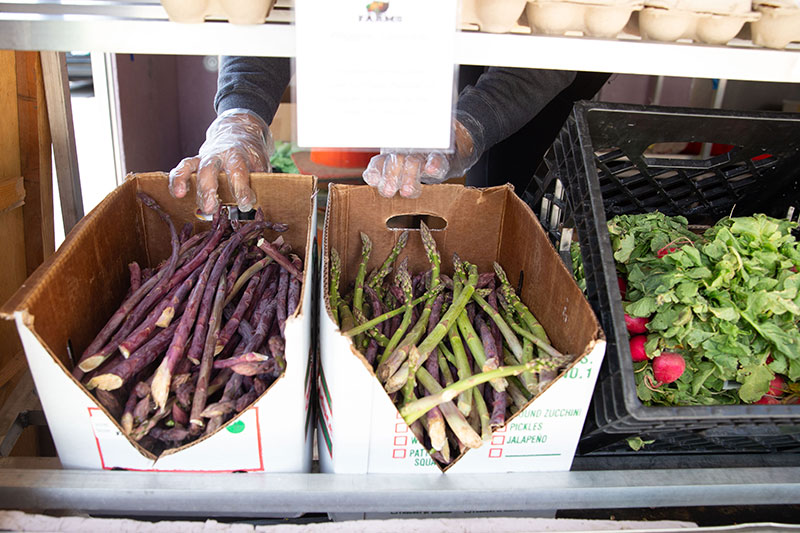
Locally grown produce shown in the photo above was available to shoppers at the Community Food Bank of Grand Junction’s Harvest Mobile Market on Wednesday, May 23, 2024, at the Mesa County Human Services campus in Grand Junction. Photo by Luna Anna Archey / Special to The Colorado Trust
Wenger, 38, grew up in Clifton in a food-insecure household. She said she never had peaches growing up, even though they’re grown in nearby Palisade.
Front-line food system workers and migrant farmworkers, too, are often food insecure, Wenger said. They usually don’t have access to the food they produce, with much of it going to more affluent markets in the central mountain region and the Front Range.
“It’s heartbreaking; it’s your culture, community, but you’re priced out of it,” she said. “I have a deep, personal understanding of the need and what it feels like—it’s sort of like being backed into a corner with no good options.”
According to the Mesa County Blueprint to End Hunger, 20,500 people (14% of Mesa County residents) are considered food insecure. In Mesa County Valley School District, 52% of children qualify for free or reduced-price lunch. The Community Food Bank has served more than 11,000 unique individuals in the past year, or 7% of the county population.
Carrie Gillette, 67, is a community advisory board member and food pantry client. She volunteered at a Harvest Mobile Market event outside a physician’s office in early April.
“Take a bag, get as much as you want,” Gillette encouraged people who stopped by while she replenished bundles of chard, beets and radishes in the display window.
Gillette remembers growing up in Louisiana, where farmers would drive down the street selling their produce and how grateful her mother was to save a trip to the grocery store.
“We knew it was good and straight from the farmer,” she said. “I’m pretty sure people will be willing to pay because they won’t have to go to the grocery store. A lot of people don’t have transportation or are busy. We’re coming to the people.”
Wenger said there’s a perception that locally grown food is elitist and that low-income people don’t value and won’t pay for food from local producers, but that’s not necessarily true. She said that low-income communities are underestimated all the time in many ways.
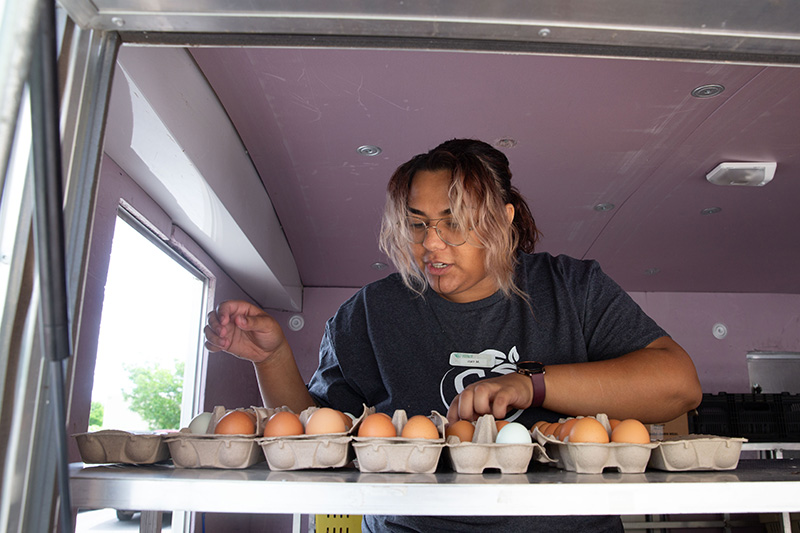
Community Food Bank of Grand Junction intern Relena Mosley packages eggs at the Harvest Mobile Market on Wednesday, May 23, 2024, at the Mesa County Human Services campus in Grand Junction. Photo by Luna Anna Archey / Special to The Colorado Trust
Garden Village Apartments Property Manager Jaye Baugh said a mobile market there would be popular with residents as long as the food is affordable.
“A lot of them actually go to the Dollar Store and Big Lots, both located across the street,” she said. “There’s no fresh produce there, only frozen and lots of canned foods and chips.”
At Candlewood Park, a mobile-home community in Clifton, another Harvest Mobile Market visit took place in April. Wenger appeared to know many neighborhood kids hanging out in the park who came by to greet her. Some went home to tell their parents about the available veggies. Wenger said there are no nearby grocery stores—only fast-food restaurants.
“In Mesa County, the number one cause of death is cardiovascular [disease],” she noted. “There are five times more fast-food chains than healthy food outlets in Mesa County.”
Community Food Bank of Grand Junction held 15 mobile markets at community partner sites in 2023 and plans to run at least two to three mobile markets weekly in 2024 from April through October. For data collection purposes, staff weigh clients’ produce bags and conduct a short survey regarding household size, ability and willingness to pay for produce at future mobile markets. Bilingual staff members also inform clients about other available benefits.
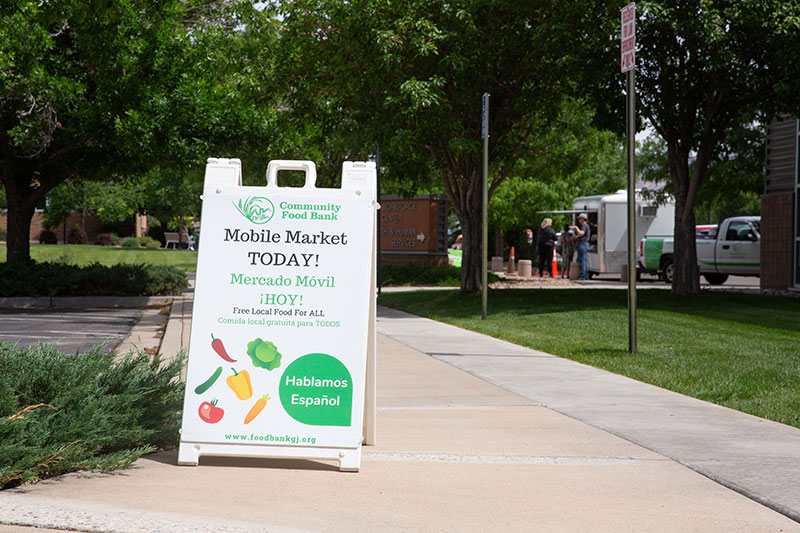
A sign in English and Spanish is displayed advertising the Harvest Mobile Market, a pilot program of the Community Food Bank of Grand Junction, on Wednesday, May 23, 2024, at the Mesa County Human Services campus in Grand Junction. Photo by Luna Anna Archey / Special to The Colorado Trust
Community Food Bank began delivering groceries to people’s homes during the COVID-19 pandemic and averaged 400 grocery deliveries per month from late 2022 to early 2023. But delivery logistics are complicated and expensive, and the food bank scaled back its monthly home deliveries to 200 households, reserving deliveries for its most underserved clients. Wenger said the mobile market idea is another way to serve people with transportation and other barriers to accessing fresh food.
A rare rainy afternoon did not deter some residents of Grand Valley Apartments, a community of modest duplexes in Clifton, from coming to a Harvest Mobile Market event there in April. The property management director, Colleen Simpson, estimates that 20% of the Grand Valley Apartments residents don’t drive.
Eighteen-year-old Christopher Arwood said he was there to pick up “good” food for his family. He and his younger sister, who both work at Wendy’s, share one of the duplexes with their mother, who does patient intake at a local hospital. Arwood said their household income is too high to qualify for SNAP benefits, and he feels “looked down upon” when seeking assistance elsewhere.
As he was leaving with his bag of fresh produce and eggs, he mentioned he was looking forward to a dinner of mashed potatoes and salad.
“I don’t feel like a burden coming here to pick up food,” he said. “I appreciate what you all are doing for the community. If it’s locally grown, yes, I’d be willing to pay.”
